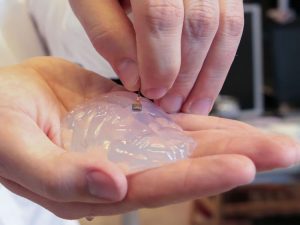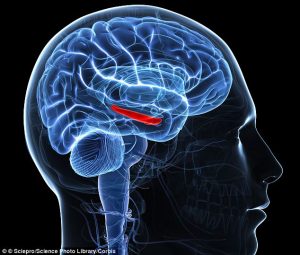Scientists are now working to develop a specialized brain implant that will assist gambling addicts with breaking their addictions. Research has shown these implants may be able to stop the impulse behaviors, which is caused when the brain’s pleasure area is triggered.

A Possible Solution
 Researchers from the Stanford University Medical Center in California conducted a study on mice that had an addiction to fatty-filled foods. Dr. Casey Halpern, lead researcher, and his team discovered that a certain pattern would occur within the rodents’ brains right before they began eating. This specific pattern would, in turn, cause the animals to overeat.
Researchers from the Stanford University Medical Center in California conducted a study on mice that had an addiction to fatty-filled foods. Dr. Casey Halpern, lead researcher, and his team discovered that a certain pattern would occur within the rodents’ brains right before they began eating. This specific pattern would, in turn, cause the animals to overeat.
Since the pattern inside their brains was electrical, the team decided to place electrodes within the area of the brains that activates feelings of pleasure when experiencing rewards. The pulse of electricity lasted for only about 10 seconds, but, the scientists saw a significant difference in the way the mice responded. They did not devour nearly as much food as they had before the electric pulses were given.
The team had discovered a man with obsessive-compulsive disorder (OCD) had also received an implant to assist with his impulses. This showed researchers that humans possess the same ability within their brains.
“Imagine obese people or pathological gamblers who are bankrupt, or even a depressed patient who has the impulse to commit suicide,”
Halpern explained to NBC News. “I suspect not everybody would want one, but you’d be surprised how many are willing to get these implants because it could improve their quality of life tremendously.”
Other Options
For some, a brain implant may seem a bit scary. However, this is not the only solution that is being worked on to help addicts with their gambling habit. A study is currently under way to determine whether a nasal spray, proven to help stop drug addiction, could also be used to help gambling addicts.
 The study will be conducted by Finnish researchers, and currently, it has a total of 30 participants. Researchers hope the number will climb to 130. The U.S. Food and Drug Administration initially approved the use of the nasal spray, naloxone, in 2014, and it has helped greatly in lowering the number of deaths from opiate overdose in American cities.
The study will be conducted by Finnish researchers, and currently, it has a total of 30 participants. Researchers hope the number will climb to 130. The U.S. Food and Drug Administration initially approved the use of the nasal spray, naloxone, in 2014, and it has helped greatly in lowering the number of deaths from opiate overdose in American cities.
Although the spray has never officially been tested on gamblers, past evidence suggests a strong possibility that it will help. The pill form of the spray has been shown to be somewhat beneficial for gamblers. However, Finland’s National Institute for Health and Welfare believes the spray could work faster and prove more beneficial than the pills.
“If you really want to play, you can use the spray and the urge will go away,” says Hannu Alho, research professor. “Preventing the urge with medicine might help them not to play or play for just a bit and then stop.”
Concerning Numbers
Across the world, the amount of people addicted to gambling continues to increase, and it is becoming more of a concern. According to one report, 15 million people are at risk for gambling addictions in America alone despite the ban on online gambling.
The U.K. Gambling Commission also reports that more than 2 million people are addicted or in grave danger of becoming addicted. In Finland, people between the ages of 15 to 74 suffer from gambling addiction on some level.
With researchers gearing up to begin the nasal spray trial at the end of the month, they are hopeful it will bring about good results. The trial is set to last 12 to 18 months and should it be successful, the team will then begin looking at how the nasal spray will affect those addicted to alcohol.
Disclaimer: All images are copyright to their respective owners and are used by USA Online Casino for informational purposes only.












